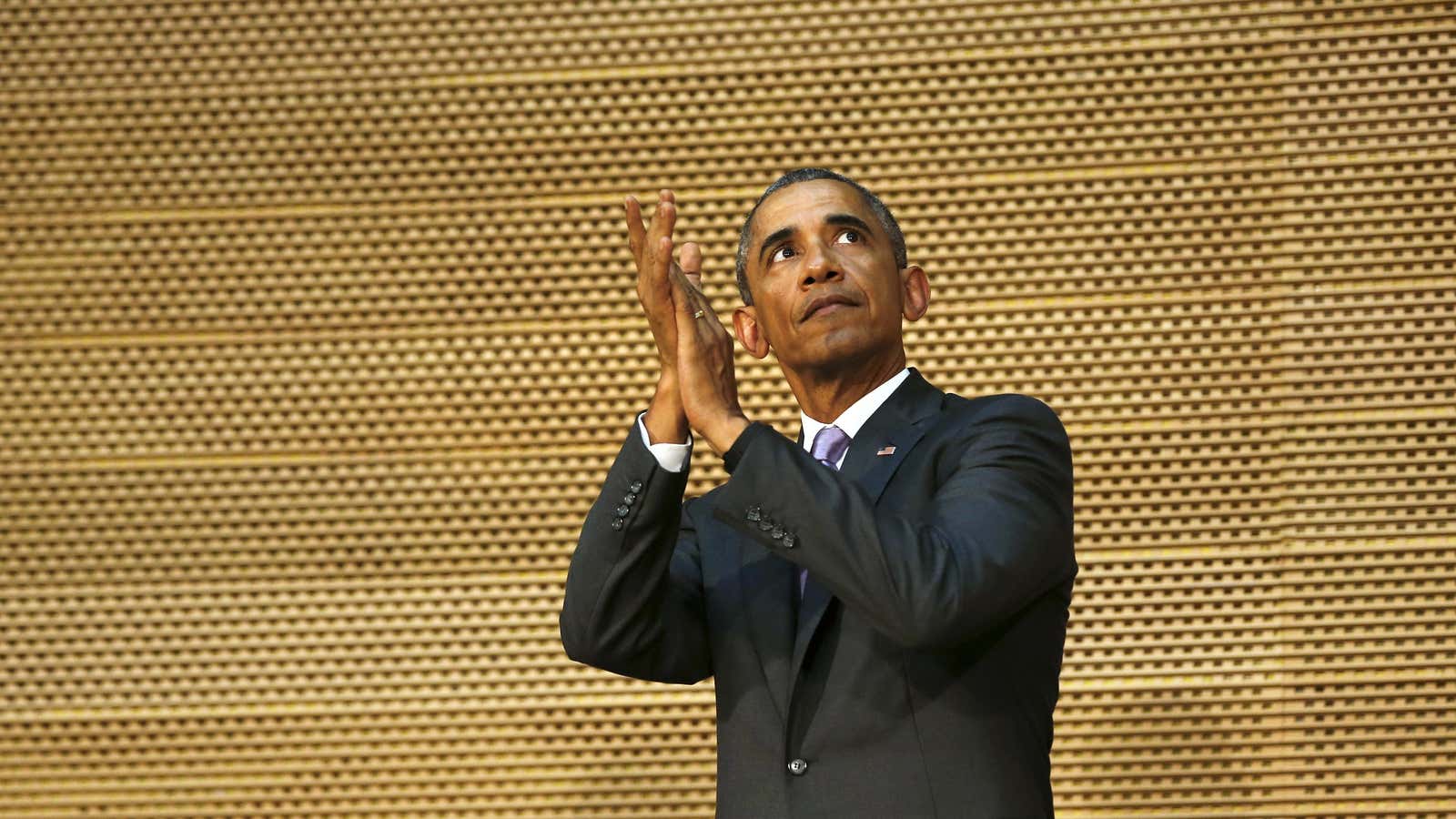Now that we know Donald Trump will become the next president of the United States, we can start talking about the legacy of Barack Obama. Two months before he leaves office, this is the paradox facing the first American president with African ancestry: the sentiment that he hasn’t done much for the continent his father left almost 60 years ago.
To his credit, president Barack Obama visited Africa four times: In 2009, he landed in Cairo, where he delivered a major speech to the Muslim world; he visited Ghana in 2009, and spoke about Africa’s central role in the world; he went to Senegal, South Africa, and Tanzania in 2013; and in 2015, became the first sitting American president to visit Kenya and Ethiopia.
Obama engaged the continent’s young through programs like the Mandela Washington Fellowship and elevated entrepreneurship and trade to the forefront of the US-Africa engagement policy. His administration worked to support agricultural production and health systems, launched the Power Africa program to enable millions access to electricity, and resettled thousands of refugees from the continent.
But in the final months of his presidency, the dominant talk of “Africa’s favorite son” continues to be one of dismay and disappointment. The reasons for this are diverse and can be traced to personal, political, economic and security issues. To be honest, Obama is wildly popular across Africa, but the received wisdom now is that he neglected the continent in his first term, and delivered “too little too late.”
Africa’s expectations from Obama “are valid,” says Michael Orwa, a development and international affairs expert at the United States International University-Africa in Nairobi. But Obama, he says, “was not an African envoy to the USA, he was the US president whose primary responsibility is to the American people and US strategic interests. These he has delivered on, even when they seem to conflict with Africa’s best interest.”
Many observers were surprised when Obama slashed hundreds of millions of dollars from the AIDS relief program started by his predecessor, George W. Bush. The president was also criticized for the way he handled the Libyan crisis, and for bequeathing the continent another failed state. Obama’s administration also played a key role in the birthing of South Sudan, but that country’s descent into chaos will not help the legacy of his policies in Africa.
Obama has also been criticized for overseeing a two-way trade, much of it reliant on the export of extractive resources. Observers say the administration didn’t build a symbiotic relationship with the continent or view its countries as a full-on trading partner. According to a Brookings Institution report (pdf), agreements like the Trans-Pacific Partnership are also likely to undermine the $37 billion US-Africa trade, given that the continent isn’t part of these mega trade negotiations.
When president Obama visited Ethiopia in July 2015, he was criticized for labeling its government, which had cracked down on press freedom and won 100% of the seats in government, as “democratically elected.” His administration has been excoriated for throwing in with despots who had no intentions of fostering democracy, including Gabon’s president Omar Bongo, Rwanda’s Paul Kagame, and Uganda’s Yoweri Museveni.
As the journalist and academic Howard French put it, this relationship with the strongmen mirrored “the style of cherry-picking allies during the struggle against communism.” Except that the Cold War was now replaced with the War on Terror, which oversaw the creation of a lethal presidency and massive militarization. In Niger, for instance, one of the world’s poorest countries, the United States is building a $100 million drone base.
At the twilight of his presidency—not to mention the looming Trump leadership—assigning the blame of Africa’s problems to Obama is a bit out of hand. He was first and foremost an American president, who was there to serve American interest in the continent. To claim that he was special for the continent is also a flawed argument. Perhaps Africa should have heeded Obama’s message when he stood in Ghana in 2009 and said, “We must start from the simple premise that Africa’s future is up to Africans.”




